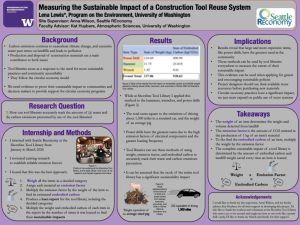Measuring the Sustainable Impact of a Construction Tool Reuse System
With the global stress on landfill capacity and atmospheric CO2 emissions caused by human consumption, there is a need to reimagine our habits. Construction materials, specifically household tools and materials are a part of the over-consumption. Many homes purchase a new item, like a power drill, only to use it sparingly. Communities can deter waste from landfill and carbon emissions from production by following the circular economy model and reusing shared items, like by using a tool library. The purpose of this study is to develop a set of methods to measure the sustainable impact of a tool library, and to evaluate the effectiveness of the Shoreline Tool Library through the application of these methods. In order to develop these methods, I worked with Seattle REconomy at the Shoreline Tool Library. I conducted an initial literary search for research concerning embodied carbon on construction materials; primarily steel, plastic, iron, wood, and electronic components. To find the weight deterred from landfill I weighed tools in the library. I then multiplied these weights by the materials’ associated emission factors to find the embodied carbon of each target tool. This project revealed that in Winter 2024 the Shoreline Tool Library prevented 528.62 kgCO2e from production, and 137.86 kg from landfill. These methods of finding weight and embodied carbon can be used to prove the sustainable impact of a re-use system, and encourage support for local tool libraries.
